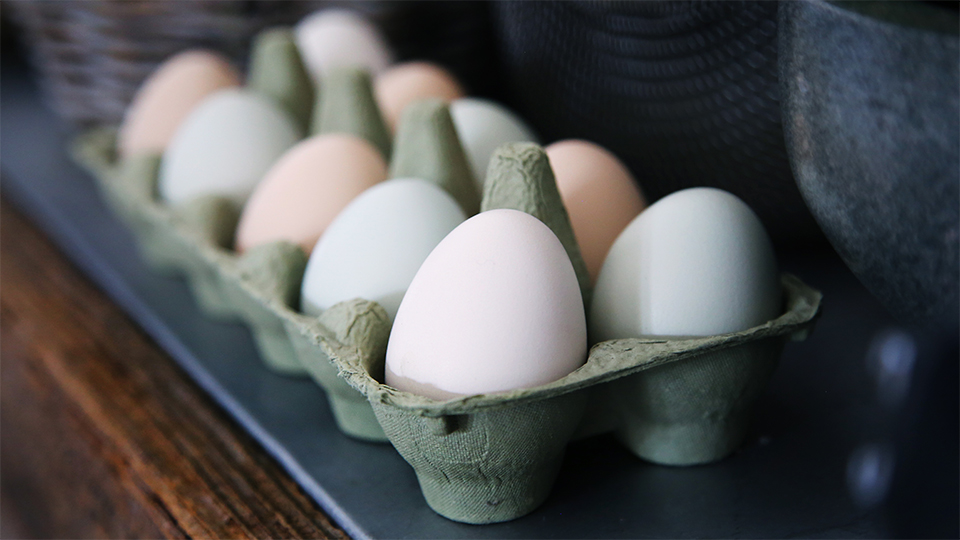The Eggcellent Truth About Eggs

Spare a thought for the humble egg – not the chocolate ones, the ones you can eat day-in-day-out and which are actually good for you.
Just a reminder – mysteriously, rabbits of any kind, including the Easter bunny, do not lay eggs. Least of all chocolate eggs.
A unique feature inherited by all birds from their dinosaur ancestors, eggs solved the problem of packaging offspring into a neat package where all nourishment is provided from fertilization to eventual hatching. A pretty neat trick when your main mode of transport is flying.
Modern hens are the product of generations of selective breeding. Unlike their ancient jungle cousins, they lay large eggs, like clockwork. Each day, sunshine triggers a hormonal cycle that activates their ovaries. Through a complex cycle an egg is produced – about one per day. Hens attempt to generate a clutch of about a dozen eggs. If given a chance, the hen will then sit on her clutch, in the expectation of a bustling brood of chicks.
The modern hen never gets this chance, with each egg being whisked away after laying. Humans have been eating eggs, fertilized or unfertilized, for many thousands of years. What makes eggs so amazing is their versatility and the nutrition they provide.
Eggs are composed of the white (predominately a protein known as albumen) and the yoke (which contains most of the fat, cholesterol, vitamins and minerals). The albumen protein is large and globular, meaning when it’s whipped, scrambled or boiled, the protein structure gets messed up (the technical term is “denaturated”).
Denaturating the albumen changes it from a liquid to a solid. Depending on whether air is whipped into it or not, that solid can be light and fluffy, through to a solid white lump. The success of a Pavlova is all down to the patience of denaturating the egg albumin, blending in the sugar, and a slow, low temperature oven.
The yolk supplies all the necessary nutrition for a developing chick, so it’s rich in all the essential nutrients for life. At about one-third the weight of the whole egg, the yolk contains more than two-thirds of its total energy. Eggs contain a complex mixture of phospholipids and cholesterol.
It’s the phospholipids that are necessary when making mayonnaise. An abundant phospholipid, known as lecithin is particularly good at helping fat and water mix. Just like detergent, lecithin, breaks fat into tiny droplets. When oil, water and egg yolks are whipped together the magic of lecithin forms the perfect creamy mayonnaise. Mix in lemon juice or Dijon mustard for breakfast heaven.
Eggs became a staple of breakfasts with the Industrial revolution, with both English workers and French farmers discovering the joys of a boiled egg, eaten hot or cold. With increasing industrialization, the pairing of eggs with bread and later with bacon cemented their place in our diets.
The role of the egg as a suitable food has been hotly debated for generations. Containing over 13 vitamins and minerals, a single egg provides a quarter of the daily requirements for choline and selenium. However, they are not a good source of calcium, and provide only about two percent of our daily requirement.
But eggs are rich in a family of vitamin-like compounds known as carotenoids (including lutein and zeaxanthin). These carotenoids accumulate in the retina of the eye where they work as powerful antioxidants to help limit damage to the sensitive pigments that respond to light. There are scientific studies that have shown that eggs can improve eye function, but eggs appear not to be able to prevent the loss of eye function through degeneration of the retina with ageing, a condition known as macular degeneration.
A typical egg contains six grams of high quality protein, helping you feel fuller for longer. A single egg, compared with cereal, croissants, toast and a bagel, has consistently been shown to be superior at reducing hunger, right through to lunchtime. But there is no evidence that eating more eggs will help you lose weight. Despite claims of spectacular weight loss from a boiled egg-based diet, there is no scientific study to support this, and it’s certainly not recommended.
Again, despite the myths, eggs are not the cause of excessive or smelly farts. It’s simply an unfortunate coincidence that rotting eggs emit the gas sulphur dioxide, which is also one of the gases than can escape from our bowels.
Another unfortunate coincidence for eggs, is the high levels of cholesterol found in the yolk. The cholesterol in eggs is readily absorbed, yet despite this there is extensive scientific analysis has shown that eating up to five or six eggs per day has, at best, a very minor ability to raise the dangerous circulating LDL-cholesterol.
In the most recent scientific analysis of the actions of eggs, three eggs each day was shown to be beneficial and increase the levels of the good cholesterol (HDL-cholesterol). In 2013 the British Medical Journal concluded that eggs posed no risk of heart disease or stroke for most people.
As the famous advertisement once put it, go to work on an egg!
This piece originally appeared on lesmills.com